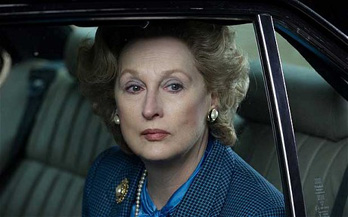Movie Review: The Iron Lady
By Tom Houseman
January 16, 2012
BoxOfficeProphets.com

So director Phyllida Lord and writer Abi Morgan faced two challenges: how to tell Thatcher's story within the frame of a film, and how to present Thatcher to their audience. To say that they picked the absolute worst method by which to present Thatcher's life might be excessively harsh, but sitting through The Iron Lady, I couldn't think of how they could have presented her life in a less interesting way.
The Iron Lady is told in flashbacks, intercut with scenes of a much older Thatcher struggling with dementia. This tool was, I think, used to help the audience sympathize with Thatcher, by showing her humanity and vulnerability. But considering all of the extraordinary (and, let's be honest here, mostly horrible) things that Thatcher did, why continually break up the story of her rise to power with scenes of her hallucinating that her dead husband is still alive? Her dementia is no different from anybody else's, and considering what a powerful and controversial figure Thatcher is, why would we spend so much time on such an ordinary aspect of her life? All these scenes of the elderly, post-relevant Thatcher do is grind the narrative to a halt.
So we do see Thatcher's rise to power, which Morgan and Lord portray as an underdog tale, a woman overcoming the odds to achieve all her dreams, but the film meanders so much that this part of the story long outstays its welcome. What neither writer nor director realize is that anybody who wants to see a movie about Thatcher wants to see the badass in action, refusing to take shit from anybody, standing up to union leaders and other politicians without an ounce of humility or shame. This is what made Thatcher such a polarizing figure, and the scenes we do see of this hubris, such as when she essentially declares war on the Falkland islands, are mesmerizing. Why is more of the movie not like those few wonderful scenes?
Do I really need to talk about how extraordinary Meryl Streep is in the film? Can we just assume that whatever she is in is tenfold better thanks to her presence? During the dementia scenes Streep is captivating, moving, heartbreaking. Yes, these scenes are a waste of time, but there are few worse ways to waste time than watching Streep at the top of her game. But it is when we see Thatcher stand up and fight that we get a glimpse of Streep at her best. Considering her long and remarkable career it is impossible to point out one performance of Streep's and say “this is her best performance ever,” but when there is a list made of all of her great performances, playing Thatcher will certainly be mentioned.
If only the rest of the movie did her justice. When we see Thatcher bare her fangs, dig in her hoofs, and portray various other aspects of intimidating animals, it is truly a sight to behold, and the last half hour of the film allows Streep to explode on the screen with all of the power of a woman who clearly revels in being hated. This is the Thatcher we are paying to see, not the wide-eyed doe who is trying to forge her own path, not the sad, pity-inducing woman who is filled with loneliness. We want to see a woman who deserves the moniker Iron Lady, and when we do get to see her, in all her glory, it is almost magical. Sadly, those scenes are too few, and with too much fluff between them, to make The Iron Lady anything more than another forgettable biopic, another example of Streep's brilliance, another failure of a film to live up to its potential. What a shame.